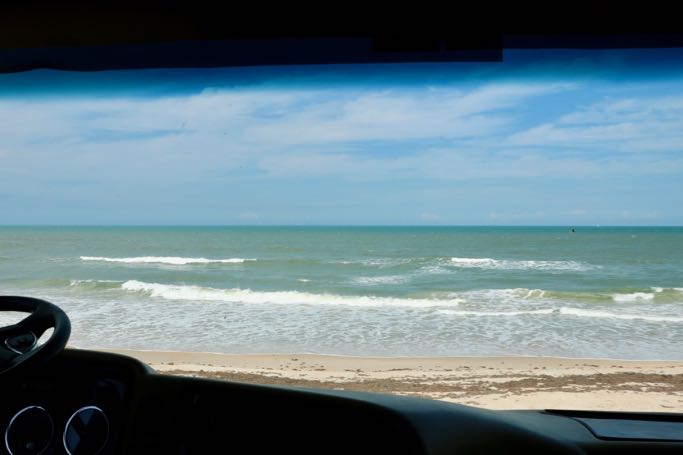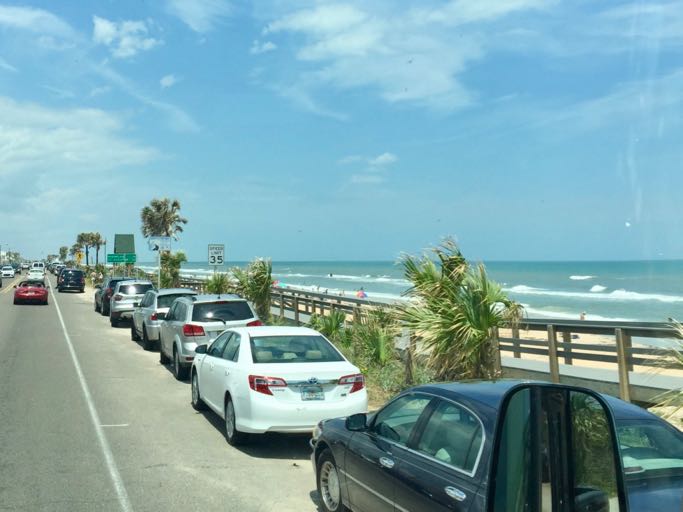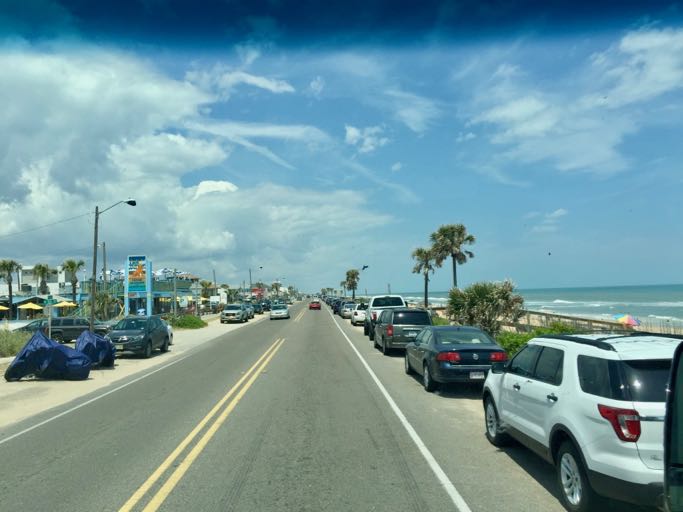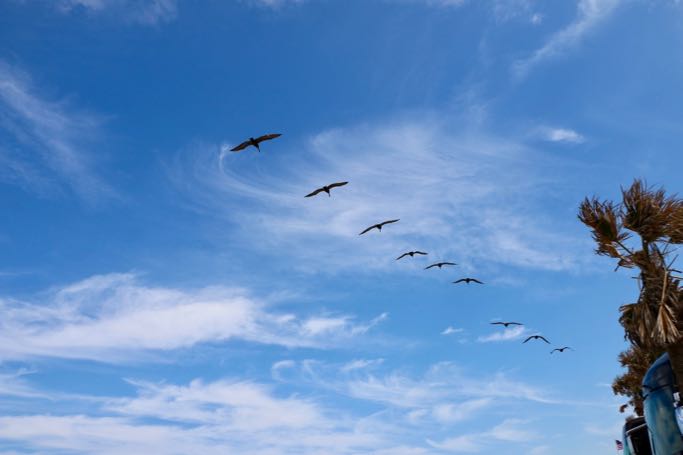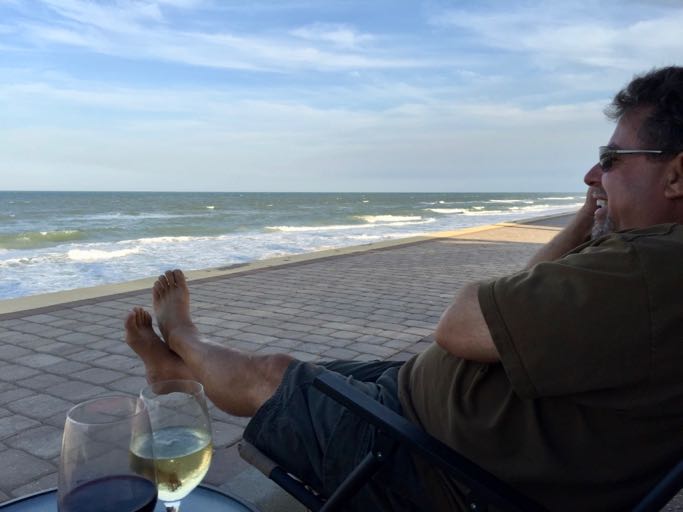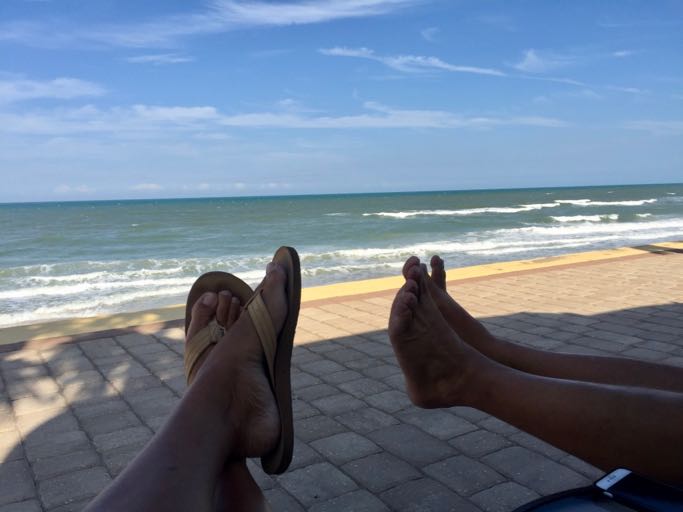We needed place to stay while visiting Daytona International Speedway, and landed at Beverly Beach Camptown. Still on the tail end of spring breakers, available campgrounds closer to the speedway were a no-go. We prefer to be on the beach whenever possible, anyway. Finding one in this area directly on the beach is rarity. As you might imagine, hotels occupy most of the coastline. Beverly Beach Camptown is about a 20 minute ride away from the speedway, and it’s a nice campground, so it’s all good. The area suffered damage from a Hurricane Matthew last October, and the repairs are ongoing. The landscape was changed dramatically, or so we were told by the locals. The sand has changed, parking has disappeared, and entire piers are gone.
The sand here is loaded with crushed shells.
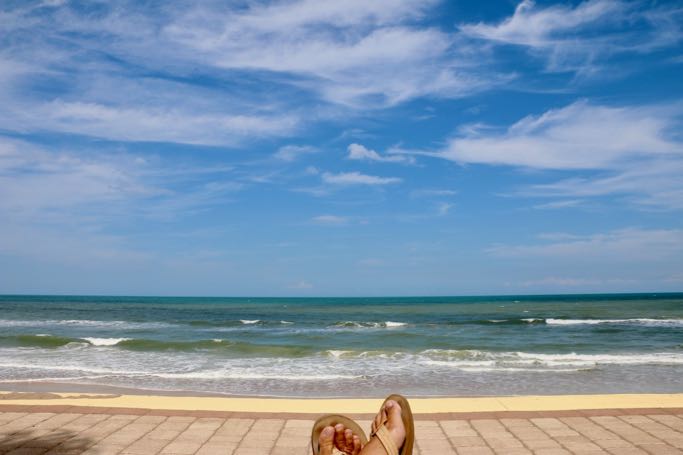
It looks like the ocean is steps away, but there’s actually drop off where the yellow line is painted. The beach is about 8 feet below.
Steve and I have observed how different safety measures are in the South versus lawuit-happy Southern California. Notice the absence of a rail in the above photo. You step off that sidewalk and fall 8 feet down to the beach, it’s your own darn fault. A rail, fence, or some other view-crushing safety measure would surely be present at a San Diego campground, for fear of being sued.
Same is true regarding stairs, streets, hills, and paths all over the South. You name it, in this part of the U.S., use at your own risk. Maybe it’s because Southerners have had to deal with cobblestones, heights, and water hazards for centuries. No one is going to pay for your mishaps. People have been walking on the cobblestones, stone stairs, slippery bridges, and elevated pathways for generations. Deal with it. Much of it is historic, and they’re not going to touch it.
Steve and I both loved the lack of “do not touch” and “do not enter” signs.
Another thing we learned while staying here: The Atlantic coast is MUCH different than the Southern California coast when it comes to wind. San Diego may have onshore air flow on occasion, and most times it’s relatively mild. At home we have an entire continent and a massive desert to the east, the earth’s rotation often brings warm, offshore air flow. The Atantic coast has an entire ocean behind it’s onshore air flow, and it’s more constant and powerful. The wind at this beach brought with it ocean spray and airborne sand. And that’s parked over 8 feet above the sand. Prior to this stop, we thought there were far more RV owners in these states that were obsessed with how pretty their RV looked. Now we know it’s a matter of keeping the salt and sand off chrome and paint. It only takes a couple of days to see the early stages of rust appear. Egads.
If you ever decide to stay here, the sites are a mix of dirt and sand, and only the north end sites have a concrete slab patio. If you’re particular about a sandy, salty film covering your windshield and exterior, consider staying in the second row. I’m not sure how much that will help, but our coveted ocean-front campsite mindset has changed a bit since our stay here.
Steve and I have been enjoying our travels immensely. Whether it’s wine or a non-alcoholic beverage, we find ourselves constantly toasting to our views and happiness. “Cheers” seems so generic, so while chatting in the photo above, we decided we needed our own special toast. Others have theirs, “Prost”, “Salud”, “L’chaim”. We were a little weirded out when we felt the universe heard us. Just moments later, a beautiful elderly woman walked in front of us and stopped for a chat. Her accent was so thick it was a bit of a struggle to understand her. By her appearance, we guessed she was from somewhere in Europe or Russia. Her accent was not noticeably any language’s we could identify. Not French, German, Italian, Russian, any country in the Netherlands. Our conversation was brief, quite brief in fact. After maybe three minutes tops, she raised her glass to us and said, “Cin, cin!” (chin, chin), then moved along. It was as if the only reason she was there was to give us our toast. We never saw her again.
Next time we’re together, dear family and friends, we hope to raise a glass with you.
Cin, cin!
